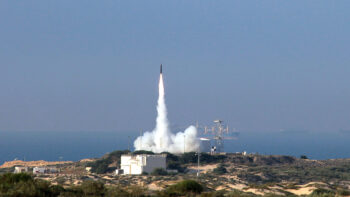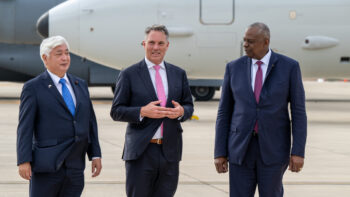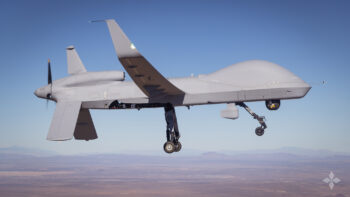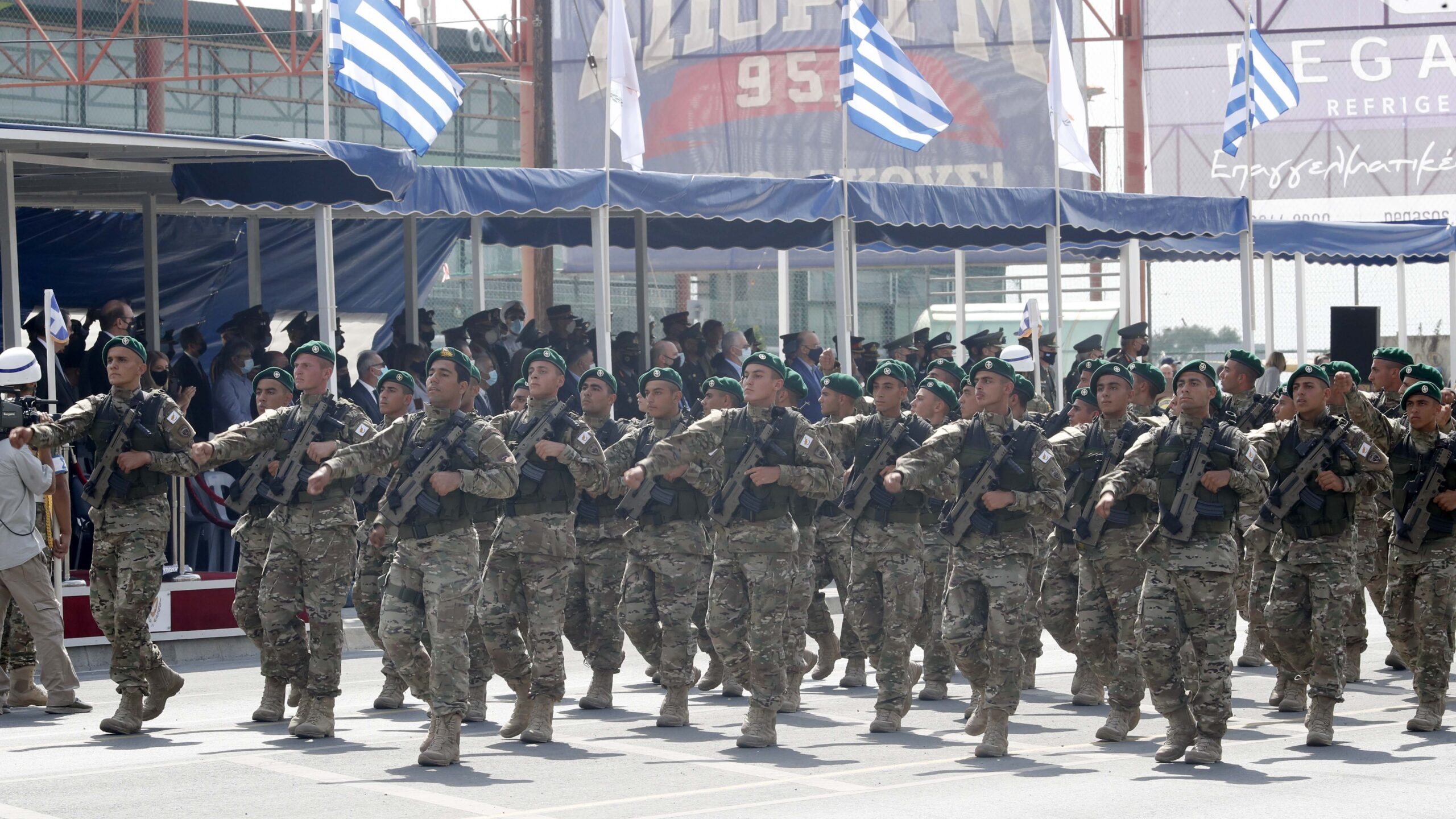
Soldiers of Cypriot National Guard march on a military parade celebrating the 61st Independence Day of Cyprus in Nicosia, Cyprus, on Oct. 1, 2021. (Photo by George Christophorou/Xinhua via Getty Images)
With the US and others rushing to keep Ukraine supplied with weapon systems, a recent US political move may have opened up a new source: Cyprus. In the op-ed below, The Foundation for Defense of Democracies Ryan Brobst, Jonathan Schanzer and Bradley Bowman argue that if it’s clever, the Biden administration could help Kyiv while helping itself in the Mediterranean.
The Biden administration announced on Friday a decision to lift the decades-old arms embargo on Cyprus for the coming fiscal year. This laudable step recognizes Nicosia’s progress related to financial reforms and denying port calls of the Russian navy.
More importantly, it offers a valuable opportunity, with some delicate diplomatic maneuvering, to reach an agreement with Nicosia to transfer some of its Russian-made arms to Ukraine in return for the provision of modern US equipment and other security assistance.
In the short term, this would provide Kyiv much-needed replenishment of weapon systems that its military already knows how to operate. In the longer term, this is an opening to pry Cyprus out of Moscow’s orbit, improve the capability of Cyprus’ military forces, enhance their ability to operate with the US military and promote regional security in the Eastern Mediterranean.
According to the Department of State announcement, “the Republic of Cyprus has met the necessary conditions under relevant legislation to allow the approval of exports, re-exports, and transfers of defense articles to the Republic of Cyprus for fiscal year 2023.” Those conditions include continued cooperation related to strengthening anti-money laundering regulations and financial regulatory oversight and undertaking steps to “deny Russian military vessels access to ports for refueling and servicing.” Cyprus must continue to demonstrate progress, as certification is required annually.
The arms embargo on Cyprus was originally enacted in 1987 in an effort to bring about a negotiated settlement to a conflict involving Cyprus, Turkey and Greece. The arms embargo was intended to prevent an arms buildup on the island and to push the countries to reach an agreement through diplomacy.
In reality, the embargo succeeded only in preventing Cyprus from buying US arms, while Ankara provided arms to the Turkish-occupied north of the island. With few options, Cyprus elected to procure weapons from other countries such as Russia, as governments tend to do when they cannot acquire American arms.
Fortunately, there has been progress in recent years toward re-opening closed doors. In September 2020, the Trump administration partially lifted the arms embargo on Cyprus, permitting “non-lethal” assistance. These efforts culminated in Friday’s announcement, which fully lifts the embargo for at least a year.
And here is where the US, Cyprus and Ukraine can benefit. Cyprus’s Russian-made wares are among more than 6,300 weapon systems available for potential transfer from a variety of countries, according to a study conducted at the Foundation for Defense of Democracies.
Specifically, Cyprus possesses 82 T-80U tanks, 43 BMP-3 infantry fighting vehicles, 11 Mi-35P helicopters, 6 Tor-M1 air defense systems, 4 Buk-M1-2 air defense systems, and 4 BM-21 multiple rocket launchers, according to the International Institute for Strategic Studies Military Balance 2021. All of these systems are either currently operated or have close variants operated by the Ukrainian military. They can immediately be integrated, even as Ukraine gradually shifts to more modern and capable Western systems. Indeed, Ukraine still mostly operates Soviet-era equipment and does not have the luxury of waiting years for high-end systems to arrive in sufficient quantity.
The Russian vehicles, artillery, and air defense systems that Cyprus currently possesses can augment Ukraine’s existing inventory, replace equipment losses, and sustain existing systems.
It’s time for the Biden administration to make a deal. Nicosia is unlikely to agree to such transfers absent confidence that Washington and/or its allies would provide replacement capabilities. That’s because of the threat from the more than 35,000 troops Ankara maintains in the northern third of Cyprus.
Cyprus’ defense minister ruled out sending weapons to Ukraine in April. But that was before last week’s announcement. And there have been mixed signals from the Cypriot Ministry of Defense suggesting such a transfer might be possible. It falls on Washington to guarantee Nicosia new weapons to replace the transferred Russian weapons.
This should be an exciting prospect for Cyprus, which desperately needs to improve its military preparedness. The United States could provide M1 Abrams tanks, Stryker combat vehicles, AH-64 Apache helicopters, and a range of artillery and air defense capabilities. US allies could also contribute, as France has sold anti-air and anti-ship missiles to Cyprus, and Israel has sold drones and a patrol vessel to Cyprus within the past five years.
Admittedly, it could take years for some of these systems to arrive, due to long queues for the weapons in some cases and longstanding industrial capacity issues in the United States. Plus, if the US industrial base can produce additional armored vehicles, artillery and air defense systems in the short-term, Ukraine is their likely destination so long as Vladimir Putin continues his invasion.
Therefore, America and its European allies should explore interim steps to address Cyprus’ security needs in the aftermath of any major transfers to Ukraine until replacement arms arrive. This could include Washington working with European allies to identify interim defense capabilities transferable to Cyprus (from a fellow member of the European Union), especially US-origin equipment in European arsenals that could not have been provided before the arms embargo was lifted. Such steps could also include increased US Navy port calls, combined military exercises and training with Cyprus, and even the temporary stationing of new or additional US and allied rotational forces there with Nicosia’s consent.
To help fund the transfer of this equipment, Cyprus should be added to the European Recapitalization Incentive Program (ERIP). ERIP is a US State Department program in which Foreign Military Financing is allocated to partner countries to help them transition away from Soviet or Russian equipment and purchase US-origin equipment. Countries such as Greece and Albania have participated to purchase infantry fighting vehicles and helicopters, the same types of systems that Nicosia would need.
The United States should also ensure that the UN Peacekeeping Force in Cyprus (UNFICYP), deployed along the de facto border with Turkey-backed Northern Cyprus, does not stop its important work. The mandate for UNFICYP is up for renewal at the UN Security Council on January 31, 2023, and Washington should work with partners to ensure the mandate is not weakened. UNFICYP maintains a buffer zone on the island and supervises ceasefire lines and could help prevent Turkish-backed aggression. Extending a strong UNFICYP mandate could help address some of Nicosia’s concerns about transferring some of its Russian arms to Ukraine.
Lifting the arms embargo on Cyprus was the right move. In fact, it was long overdue. Cyprus is an important player in the Eastern Mediterranean. The region has strategic importance, thanks to recent energy finds, not to mention Chinese and Russian advances.
Embracing Cyprus will advance Washington’s interests and promote regional security. With a little vision and adept diplomacy, it could also help Ukraine repel Putin’s invasion.
Ryan Brobst is a research analyst at the Center on Military and Political Power (CMPP) at the Foundation for Defense of Democracies, where Jonathan Schanzer is senior vice president for research and Bradley Bowman is senior director of CMPP.
Army picks Red Cat’s small quadcopter for 2nd Short-Range Reconnaissance tranche
The service and company are expected to ink a deal by the end of the year.



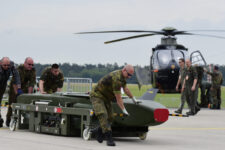

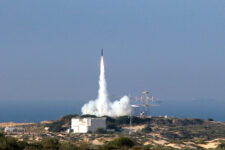





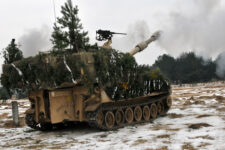


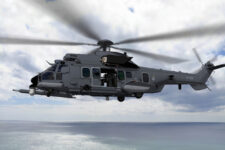

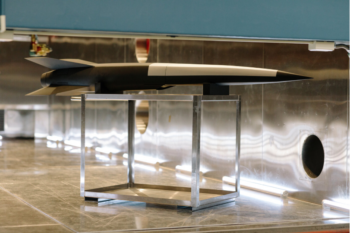
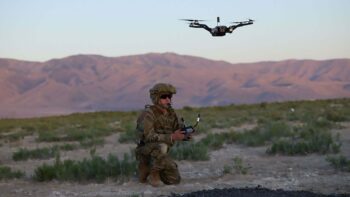
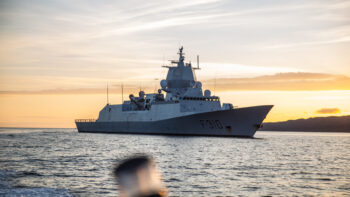


![E-2D_AR_1[1]](https://breakingdefense.com/wp-content/uploads/sites/3/2024/10/E-2D_AR_11-350x233.png)
